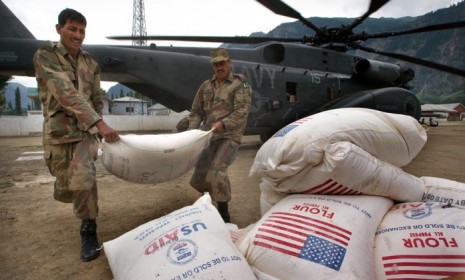Pakistan floods: 4 things the U.S. could be doing to help
America could be doing more to help the 20 million people affected by this disaster, say commentators. Here are some specific suggestions

A free daily email with the biggest news stories of the day – and the best features from TheWeek.com
You are now subscribed
Your newsletter sign-up was successful
With more than 20 million people affected and an estimated 1,600 killed, the deadly flooding in Pakistan has emerged as a full-blown humanitarian catastrophe. The U.S. has pledged $76 million so far, more than any other international donor. But even setting aside from the urgent humanitarian concerns, the U.S. has strong strategic and political interests in doing more to help the country and win over its citizens, many analysts say. (Watch an ITN News report about riots in Pakistan.) Here are five specific suggestions:
1. Boost our financial pledge by 200 percent
The international response has been "stunningly anemic" so far, and America's $76 million is a "paltry sum" compared to what Pakistan needs, say Molly Kinder and Wren Elhai in Foreign Policy. If the U.S. really wants to make this count as a hearts-and-mind coup, it should "commit to funding half of the U.N.'s appeal for immediate humanitarian relief" — some $230 million — to show "decisive action and bold U.S. leadership."
The Week
Escape your echo chamber. Get the facts behind the news, plus analysis from multiple perspectives.

Sign up for The Week's Free Newsletters
From our morning news briefing to a weekly Good News Newsletter, get the best of The Week delivered directly to your inbox.
From our morning news briefing to a weekly Good News Newsletter, get the best of The Week delivered directly to your inbox.
2. Focus on long-term food security
Immediate U.S. aid will provide a "short-lived" boost to America's tattered image in Pakistan, says The Baltimore Sun in an editorial. But the real "potential for chaos" lies in the longer-term effects of the flooding: destruction of millions of acres of farmland, loss of stored food and livestock, and the resulting risk of starvation and mass unemployment of farm workers. If the U.S. doesn't step up for the long haul, the Taliban will.
3. Launch a reforestation campaign
Pakistan will just succumb to more devastating floods if it doesn't get "better water management, better irrigation, and a reversal of the deforestation" that greatly exacerbated the flooding, says Myra MacDonald in Reuters. Reforesting the hills is the crucial part that the U.S. should focus on — even though it will involve pushback from "corrupt local politicians" in cahoots with the "illegal timber mafia."
A free daily email with the biggest news stories of the day – and the best features from TheWeek.com
4. Help Pakistan's leaders craft a PR strategy
One big reason international donors are reluctant to commit to Pakistan is what former U.N. official Mark Malloch Brown calls a tragic lack of "disciplined marketing," says Robert Mackey in The New York Times. President Asif Ali Zardari's jaunt to Europe during the monsoon rains didn't help, and the only useful part of the government now is the army. If Zardari's civilian government doesn't instill some confidence at home and abroad, no amount of aid will help.
-
 Samurai: a ‘blockbuster’ display of Japanese heritage
Samurai: a ‘blockbuster’ display of Japanese heritageThe Week Recommends British Museum show offers a ‘scintillating journey’ through ‘a world of gore, power and artistic beauty’
-
 BMW iX3: a ‘revolution’ for the German car brand
BMW iX3: a ‘revolution’ for the German car brandThe Week Recommends The electric SUV promises a ‘great balance between ride comfort and driving fun’
-
 Munich Security Conference: a showdown between Europe and Trump?
Munich Security Conference: a showdown between Europe and Trump?Today’s Big Question Report suggests European leaders believe they can no longer rely on the US for military support – but decoupling is easier said than done